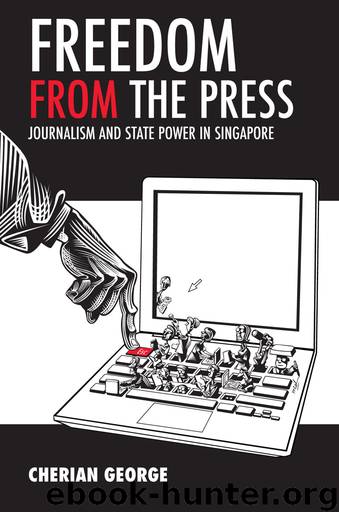Freedom from the Press by Cherian George

Author:Cherian George [George, Cherian]
Language: eng
Format: epub
ISBN: 9789971697204
Publisher: NUS Press
To these paradoxes, one could add: how is it that Asian journalism, once seen as so harmful to society that it deserved the harshest of punishments, is now held up as the embodiment of social responsibility and community spirit?
The Taming of “Asian” Journalism
While it is obvious that Singapore journalism lost its contentious edge shortly after independence, what remains to be explained is why this change has been more pronounced among Asian-language newspapers — to such a degree that they have come to be seen as even more conservative than the English press. The official narrative would answer that the non-English media represent the Singapore’s grassroots “heart-landers”, the people most appreciative of the country’s progress and grateful for the PAP’s leadership. In contrast, the English media and their constituents are harder to please and overly influenced by Western liberal ideals, including the alien notion of an independent watchdog press. This cultural explanation cannot be totally discounted. Lim Jim Koon, Lianhe Zaobao’s chief editor from 1995 to 2011, is one of those who detects a genuine difference in perspectives along language lines. Respect for authority and putting society before self are deeply internalised values in Confucian societies, he told me. Such conservatism is not unconditional, he stressed. It depends on whether their rulers govern well. “They can be very radical if they think those in power are corrupt,” he said, noting the courageous dissent of journalists during China’s tumultuous past. A 1973 Nantah graduate, he grew up watching his community’s leaders take personal risks in their struggle against the PAP. Since then, the PAP’s good governance has allowed Chinese journalists to play a supportive role in line with their Confucian values. To Lim, this is the main reason for his newspaper’s conservatism.
However, Lim acknowledged that the ideological conversion of the Chinese-educated was not always voluntary or wholehearted. Speaking to him and other knowledgeable journalists, a fuller and more complex explanation emerges for the changes in the Chinese-language press. For a start, many scholars would reject the suggestion that all members of the Chinese-speaking majority have seen themselves as winners under PAP rule. On the contrary, the fears of linguistic and economic marginalisation that stoked their activism in the early years of independence continue to be salient issues half a century later. Indeed, the quiescence of the Chinese journalists could be interpreted as a strategic accommodation, cooperating with the government on most national issues while maintaining their prerogative to speak up when their beloved language and culture are threatened.
When trying to explain the political stances of Singapore’s different language media, the right question to ask is not who loves the PAP more. Instead, we could think about who have suffered the more debilitating blows to their confidence and capabilities. The record is clear: the Chinese press has paid a disproportionately high price for Singapore’s progress. The PAP’s decision to push English as the main working language and the medium of instruction in schools is today credited as one key factor behind the country’s economic success, but it shrank the reader base of the Chinese press.
Download
This site does not store any files on its server. We only index and link to content provided by other sites. Please contact the content providers to delete copyright contents if any and email us, we'll remove relevant links or contents immediately.
Cecilia; Or, Memoirs of an Heiress — Volume 1 by Fanny Burney(32558)
The Great Music City by Andrea Baker(32018)
Cecilia; Or, Memoirs of an Heiress — Volume 2 by Fanny Burney(31956)
Cecilia; Or, Memoirs of an Heiress — Volume 3 by Fanny Burney(31941)
We're Going to Need More Wine by Gabrielle Union(19046)
All the Missing Girls by Megan Miranda(16026)
Pimp by Iceberg Slim(14506)
For the Love of Europe by Rick Steves(14121)
Bombshells: Glamour Girls of a Lifetime by Sullivan Steve(14075)
Talking to Strangers by Malcolm Gladwell(13370)
Norse Mythology by Gaiman Neil(13363)
Fifty Shades Freed by E L James(13239)
Mindhunter: Inside the FBI's Elite Serial Crime Unit by John E. Douglas & Mark Olshaker(9342)
Crazy Rich Asians by Kevin Kwan(9292)
The Lost Art of Listening by Michael P. Nichols(7506)
Enlightenment Now: The Case for Reason, Science, Humanism, and Progress by Steven Pinker(7313)
The Four Agreements by Don Miguel Ruiz(6765)
Bad Blood by John Carreyrou(6621)
Weapons of Math Destruction by Cathy O'Neil(6279)
